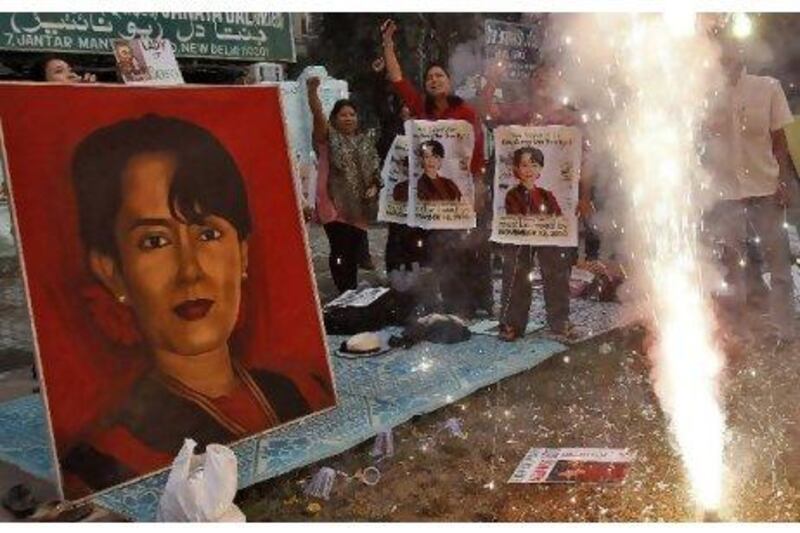MUMBAI // Officially, India welcomed the release last week of Myanmar's Aung San Suu Kyi from house arrest.
"We are confident that the release of madam Aung San Suu Kyi will contribute to efforts for a more inclusive approach to political change," SM Krishna, India's external affairs minister, said.
Myanmese exiles in the country say Mr Krishna's statement does not reflect the disappointing reality of India's relationship with Myanmar's military rulers. In fact, India is unlikely to alter its much-condemned policy of cultivating close military and commercial ties with the oppressive junta. India's growing engagement with Myanmar is unbecoming of the world's largest democracy, critics say.
"Our people will never be able to forgive the world's largest democracy for betraying the cause of democracy if it continues to engage with such a government," said Muan Kim, 33, the co-ordinator of Burma Centre Delhi, a civil-rights group formed by Myanmese dissidents living in India.
The Indian government has been too eager to show a friendly face to the junta for "short-term benefits", said Kelley Currie, a fellow with the Project 2049 Institute, a think tank basedin the United States that focuses on Asian-Pacific issues.
Myanmar is considered one of the most authoritarian regimes in the world. In June, Foreign Policy magazine ranked Gen Than Shwe as the world's "third worst dictator" after Kim Jong-il of North Korea and Robert Mugabe of Zimbabwe.
Burma Centre Delhi estimates there are 2,171 political prisoners in Myanmar. The United Nations has long been asking for their release.
After the 1988 student uprising in Myanmar, India was a vociferous advocate for the restoration of democracy in the country, which had been ruled by dictators since 1962. India offered asylum to fleeing students and New Delhi emerged as a robust base for their resistance movement. In 1993, India awarded Ms Suu Kyi one its highest civilian awards.
But in recent years, India has courted Myanmar. It has forged close political, economic and military ties with the junta. India is often competing with China over business interests in Myanmar, including vast deposits of oil and natural gas. Last year, India's trade with Myanmar reached US$1.19 billion (Dh4.3bn), a 26 per cent increase over the previous year. India's state-owned National Hydro Power Company Limited said it planed to invest $5.6bn this year in Myanmar as the country expands its energy sector.
"The junta is very cleverly playing India and China off each other," Ms Currie said. "Engaging in a race to the bottom with China is a losing hand for India. [And] by cozying up to the junta, India is prolonging a deeply unstable and dangerous regime."
However, India's policy towards Myanmar is driven more by security concerns than by commercial ones. For decades, anti-India insurgents have used Myanmar as sanctuary to launch cross-border raids. In recent months, many other such insurgent groups have shifted their bases from Bangladesh to Myanmar, with which India shares hundreds of kilometres of unfenced border.
To neutralise the groups, India, more than ever before, needs Myanmar's support along the border areas.
"It is in our vital national interest to engage whatever government is in power in Myanmar," said Mr G Parhasarathy, a former Indian ambassador to Myanmar. "While India empathises with Suu Kyi and her aspirations for her people, it can't force change in Myanmar" at its own peril.
While India's security concerns are genuine, analysts say that Myanmar's growing economic and military ties with countries such as China and India weaken EU and US sanctions imposed on the regime. In 2007, Amnesty International was outraged when India said it planned to sell Myanmar an unknown number of helicopters made with components from at least six EU countries and the US. The sale breached an international arms embargo on Myanmar in place since 1988.
In July, Jane's Intelligence Review cited satellite images to warn that such economic engagement was aiding Myanmar to develop a nascent nuclear arms programme.
"With Myanmar's current freedom from sanctions and relative economic prosperity, the junta may be able to outsource the technical know-how and tools to reach its goals far sooner than expected," Christian Le Mire, Jane's editor, said in a statement.
"India cannot be blamed for deciding that its national interests in Myanmar are more important than standing up for democracy there. Many other countries in the region have made similar calculations," said Shashi Tharoor, the former Indian minister of state for external affairs.
"It's a policy that is governed by the head rather than the heart. But in the process, India is losing a little bit of its soul."






